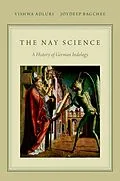The Nay Science offers a new perspective on the problem of scientific method in the human sciences. Taking German Indological scholarship on the Mahabharata and the Bhagavadgita as their example, Adluri and Bagchee develop a critique of the modern valorization of method over truth in the humanities. The authors show how, from its origins in eighteenth-century Neo-Protestantism onwards, the critical method was used as a way of making theological claims against rival philosophical and/or religious traditions. Via discussions of German Romanticism, the pantheism controversy, scientific positivism, and empiricism, they show how theological concerns dominated German scholarship on the Indian texts. Indology functions as a test case for wider concerns: the rise of historicism, the displacement of philosophical concerns from thinking, and the belief in the ability of a technical method to produce truth. Based on the historical evidence of the first part of the book, Adluri and Bagchee make a case in the second part for going beyond both the critical pretensions of modern academic scholarship and the objections of its post-structuralist or post-Orientalist critics. By contrasting German Indology with Plato's concern for virtue and Gandhi's focus on praxis, the authors argue for a conception of the humanities as a dialogue between the ancients and moderns and between eastern and western cultures.
Autorentext
Vishwa Adluri has a PhD in Philosophy from the New School and a PhD in Indology from Philipps-Universität Marburg. He is Adjunct Associate Professor of Religion at Hunter College. Joydeep Bagchee has a PhD in Philosophy from the New School and is Wissenschaftlicher Mitarbeiter at Freie Universität Berlin.
Inhalt
Acknowledgments Prologue Introduction A History of German Indology The History of German Indology as a History of Method The Origins of the Historical-Critical Method in the Neo-Protestantism of the Eighteenth Century Defining the Scope of Inquiry Plan of Study 1. The Search for an Urepos Introduction The First Phase of German Gita Reception The Birth of German Mahabharata Studies Ideas of Heroic Epic The Indo-Germanic Epic The Birth of Modern Mahabharata Studies Holtzmann's Legacy to Gita Studies 2. The Search for German Identity Introduction The Genesis of Holtzmann's Mahabharata Polemics against the Brahmans Ideas of Critical Reconstruction Ideas of Epic Composition Ideas of Religious Conflict Ideas of Textual Corruption Ideas of Historical Distortion Ideas of Enlightened Religion Ideas of Religious Persecution Ideas of Religious Corruption Ideas of Racial Contamination Evaluating Holtzmann's Textual Project Mahabharata Criticism after Holtzmann A Problem of Reception 3. The Search for the Original Gita Introduction The Gita Reemerges The Pantheistic Gita of Adolf Holtzmann Pantheism and the Bhagavadgita The Theistic Gita of Richard Garbe Ideas of Bhagavata Religion The Epic Gita of Hermann Jacobi Defending Philosophical Pantheism The Krsna Gita of Hermann Oldenberg Resistances to Modernity A Revelation and a Mystery The Trinitarian Gita of Rudolf Otto God Reveals Himself An Auto-Didact among Auto-Didacts The Aryan Gita of Jakob Wilhelm Hauer By Reason of Race The Method Becomes Autonomous The Prejudices Are Institutionalized An Essay in Understanding? 4. The Search for a Universal Method Introduction The Scientization of Protestant Theology in the Critical Method The Secularization of Protestant Theology in the Study of the History of Religions The Institutionalization of Protestant Theology in Indology 5. Problems with the Critical Method Introduction Steps toward a Scientific Indology Steps toward a Positivist Philology Construing the (Natural) Scientific Character of Philology Historicism and the Seductions of Positive Sociology Empiricism and the Search for General Propositions Criticisms of the Positivistic Notion of Truth Kant's Critical Turn and the Significance of Apriorism Rethinking the Scientific Character of the Human Sciences Conclusion: Gandhi on the Gita Bibliography Index
